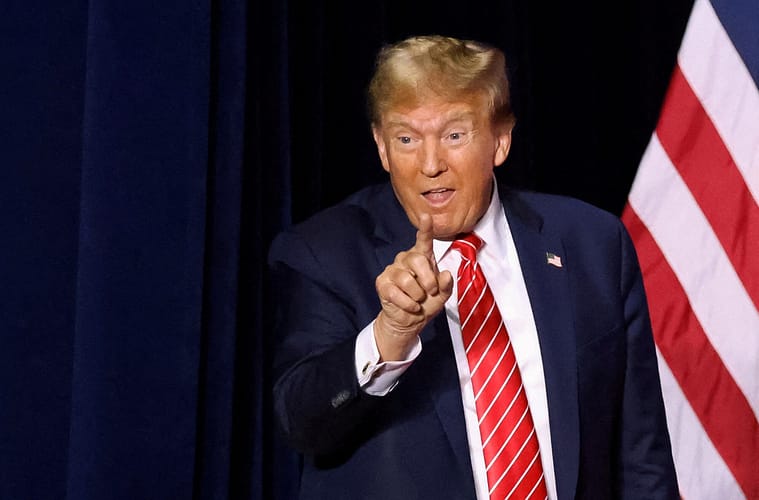Donald Trump On Iran Stance
Donald Trump’s time as President of the United States was marked by several key foreign policy decisions, particularly regarding Iran. From pulling out of the Iran Nuclear Deal to increased tensions and sanctions, Trump’s policies towards Iran have been both praised and criticized. In this article, we will review Trump’s stance on Iran, his key decisions, and the impacts of those decisions.
Trump on Iran Nuclear Deal
The Iran Nuclear Deal, formally known as the Joint Comprehensive Plan of Action (JCPOA), was an agreement reached in 2015 between Iran and a group of world powers, including the U.S., the UK, France, China, Russia, and Germany. The deal aimed to limit Iran’s nuclear capabilities in exchange for lifting economic sanctions.
One of the most significant moves of Trump’s foreign policy was his decision to withdraw the United States from the Iran Nuclear Deal in May 2018. Trump argued that the deal was flawed and did not prevent Iran from developing nuclear weapons. He believed that the deal gave Iran too much leeway and that it was not stringent enough.
Trump Iran Sanctions
Following the withdrawal from the JCPOA, Trump reinstated severe economic sanctions on Iran. These sanctions targeted various sectors, including oil, banking, and shipping. The goal was to pressure Iran to come back to the negotiating table for a better deal that would address not only nuclear issues but also Iran’s missile program and regional activities.
U.S Iran Tensions
The reimposition of sanctions led to escalating tensions between the U.S. and Iran. There were several incidents, including attacks on oil tankers in the Gulf, the downing of a U.S. drone by Iran, and the assassination of Iranian General Qassem Soleimani by a U.S. drone strike in January 2020. These events brought the two countries to the brink of conflict multiple times.
Trump On Israel
Trump’s stance on Iran was closely tied to his support for Israel. He took several actions that were seen as supportive of Israeli interests, such as recognizing Jerusalem as the capital of Israel and moving the U.S. embassy there. His administration also brokered normalization agreements between Israel and several Arab countries.
Trump consistently portrayed Iran as a significant threat to regional stability and to Israel. He accused Iran of supporting terrorist organizations and destabilizing the region through its activities in countries like Syria, Lebanon, and Yemen. By taking a hardline stance against Iran, Trump aimed to curb its influence and ensure the security of U.S. allies, particularly Israel.
Would Trump Make A Deal With Iran?
Despite his tough stance, Trump often mentioned his willingness to negotiate a new deal with Iran. He expressed a desire for a more comprehensive agreement that would not only address Iran’s nuclear program but also its missile development and regional activities. However, no new negotiations took place during his presidency.
Unlike previous administrations, Trump’s approach to Iran lacked direct diplomatic engagement. Instead, his administration relied heavily on sanctions and pressure tactics. Critics argued that this approach reduced the chances of reaching a peaceful resolution and increased the risk of military conflict.
Trump Policies Impacts on Iran and the Region
Economic Hardships
The sanctions imposed by the Trump administration had a significant impact on Iran’s economy. The country faced severe economic hardships, including inflation, unemployment, and a decrease in oil exports. These economic challenges also led to domestic unrest and protests against the government.
Regional Dynamics
Trump’s policies towards Iran also affected regional dynamics. The increased tensions and confrontations between the U.S. and Iran influenced the actions and policies of other countries in the Middle East. For example, countries like Saudi Arabia and the United Arab Emirates, which viewed Iran as a rival, felt emboldened by Trump’s hardline stance.
Supporters of Trump’s policies argue that his tough stance on Iran was necessary to curb its nuclear ambitions and regional influence. They believe that the Iran Nuclear Deal was flawed and that reimposing sanctions was the right move to pressure Iran into better behavior.
Donald Trump’s stance on Iran was characterized by a hardline approach, marked by the withdrawal from the Iran Nuclear Deal, reimposition of sanctions, and increased tensions. While his policies were aimed at curbing Iran’s nuclear capabilities and regional influence, they also led to economic hardships for Iran and heightened regional tensions. The legacy of Trump’s Iran policy remains a subject of debate, with both supporters and critics offering differing perspectives on its effectiveness and impact.
By reviewing Trump’s stance on Iran, we gain a better understanding of the complexities and challenges of foreign policy in the Middle East. Whether one agrees or disagrees with his approach, it is clear that Trump’s decisions have had a lasting impact on U.S.-Iran relations and the broader region.
Feature Image: Creator: Alyssa Pointer | Credit: REUTERS


